Each month the CrimeReads editors make their selections for the best upcoming fiction in crime, mystery, and thrillers.
*

Chris Offutt, Killing Hills
(Grove)
Offutt is overdue for a new breakout novel, and The Killing Hills may just be it, part southern gothic, part searching, seething portrait of loss and betrayal, and part an entertaining offshoot of the world of Justified. It’s set in the Kentucky hills, and when a military CID is enlisted by his sister, the town’s new sheriff, to help out with a shadowy homicide investigation, all hell breaks loose. A story full of feuds, rivalries, and crimes hiding in plain sight, The Killing Hills is as poignant and powerful as they come. –DM

Laura Lippman, Dream Girl
(William Morrow)
Laura Lippman took a break from fiction last year to publish a deeply thoughtful collection of essays, My Life as a Villainess. This year she’s back to standalone thrillers with Dream Girl, a book with “echoes of Misery,” according to the publisher’s description. A writer is recovering from an accident in his spare and hermetically sealed apartment, interacting only with his assistant and his nurse—that is, unless you believe the calls he’s getting from a character in his latest book are real…And then, of course, there’s the dead body he wakes up next to one morning. –MO

P.J. Vernon, Bath Haus
(Doubleday)
This book is so absurdly good. PJ Vernon has crafted a fast-paced thriller that will keep you reading long into the night. Bath Haus begins with a bored night in—Oliver Park is happily dating trauma surgeon Nathan, so why is he swiping through dating apps? Oliver’s boredom escalates to the point of visiting a local bathhouse hoping for a hookup, but what he gets instead is viciously attacked by a psychopathic Scandinavian. He can’t tell Nathan—it will ruin their fragile happiness, and convince Nathan that recovering addict Oliver is not to be trusted. But as Oliver makes a series of increasingly bad decisions while trying to hide the truth from Nathan, and Vernon peels back layer after layer to expose the power dynamics of their relationship, we realize that Oliver might be in more danger than even he realizes. –MO
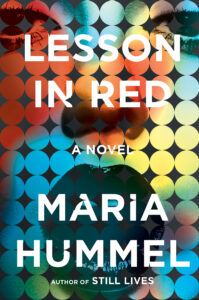
Maria Hummel, Lessons in Red
(Counterpoint)
Hummel’s last novel, Still Lives, was one of the most invigorating art world thrillers to come around in a very long time, and she’s back this year with a follow-up, Lesson in Red, that pushes that same story forward in provocative new ways. Maggie Richter is back in Los Angeles, poised to bolster the Rocque Museum’s reputation, when another death forces its way into her life, this time the death of a promising young art student. Richter ends up on a dark odyssey of the underbelly of L.A.’s contemporary art scene, which Hummel depicts in vivid, caustic detail. –DM
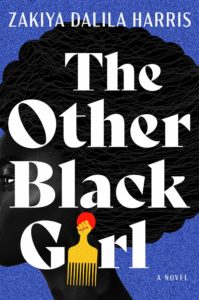
Zakiya Dalila Harris, The Other Black Girl
(Atria)
Zakiya Dalila Harris’s The Other Black Girl is a brilliant, twisty, and highly relevant thriller inspired by the author’s own experiences in working in the still very white world of publishing. An editor at a prestigious publishing imprint is elated when she finally gets another Black colleague, but her happiness quickly turns to confusion and trepidation when her coworker seems more interested in competing with her than helping her. Things get weirder when Harris’ heroine notices how strangely comfortable her colleague is in the white world, and starts getting notes on her desk telling her to leave the company—before it’s too late. Perfect for fans of Alyssa Cole’s When No One Is Watching, or Amina Akhtar’s #FashionVictim. –MO
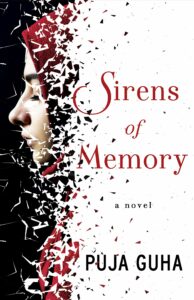
Puja Guha, Sirens of Memory
(Agora)
Guha’s Sirens of Memory is a gripping and complex story that spans borders and eras, from the Iraqi invasion of Kuwait down to the modern day in the US. Mariam, a pregnant woman fleeing a violent marriage and the invasion, takes on another woman’s identity, the wife of an aid worker from India. Decades later, at a memorial event in the US, Mariam encounters that same man and is forced to reckon with the consequences of living under his wife’s identity all those years. –DM
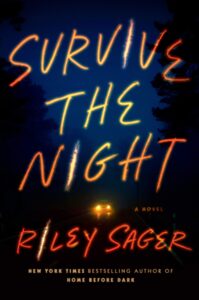
Riley Sager, Survive The Night
(Dutton)
Sager’s signature blend of campy homage and tense thrills is on full display in his new story of suspicion and doubt at 60 miles an hour. Film buff Charlie is in shock after the brutal murder of her charismatic roommate and not sure she can trust everything she sees. She’s got to get back home, but it’s the 90s, so she turns to the campus rideshare, where a clean-cut stranger offers her a ride. Charlie accepts, but immediately begins to regret her decision when she begins to suspect that the kind-hearted stranger may be the campus killer. After a game of 20 questions and a whole lot of Nirvana blaring, the action flares and you’ll find yourself racing to finish the book, just as Charlie races to get home. Oh, and in case you can’t tell already, Charlie is named for the character in Shadow of a Doubt. So, bonus recommendation just for that. –MO
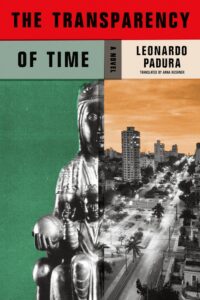
Leonardo Padura, The Transparency of Time
translated by Anna Kushner
(FSG)
From Padura, the crime fiction legend and giant of LatAm noir, comes a new Mario Conde novel, this one an epic occult history that leaps through time, place, and ideology to deliver one of the strangest, most alluring crime novels in years. Conde, now sixty and as ever full of disillusions and nostalgia, receives a new client, a former Marxist turned Santeria practitioner who wants Conde to track down a powerful statuette, la Virgen de Regla. It seems like Padura is getting more ambitious with each book, and here he’s bent the structures of the crime novel into an investigation on the astral plane, one that also happens to be a revealing commentary on the state of modern Cuba and the world pressing in on it. –DM
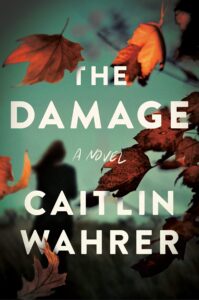
Caitlin Wahrer, The Damage
(Viking)
A seemingly perfect family is shattered by a horrible crime in this intense new thriller grappling with trauma, responsibility, and the meaning of masculinity. Nick is Tony’s younger brother, but Tony’s feels responsible for him like a parent—after all, it was Tony’s early intervention that saved Nick from the abuse and neglect of their father. Now Nick’s in college, and it’s Tony, not Nick’s parents, that gets the call to come see his brother at the hospital, where he’s undergoing exams after being assaulted by an older stranger. Their bond is strained by the attack and its aftermath, but not until the culprit is found, then looks likely to mount a strong defense, do things come truly untethered, as Tony is torn between helping his brother heal and giving in to the urge for violent restitution. Tony’s wife Julia, plain and calm in comparison to her hothead husband, is one of the most interesting characters I’ve come across, and the ending was genuinely surprising. –MO

Jonathan Lee, The Great Mistake
(Knopf)
Lee’s captivating new novel is at once an historical fiction, a mystery, a speculative investigation, and an ode to a city. His subject is Andrew Haswell Green, the man in large part responsible for so many of the public monuments and institutions that now define New York in the cultural imagination, from the Public Library to the Met. He was a truly public man, gunned down on his own doorstep at age eighty-three, a seemingly senseless killing that brought headlines and more than a few questions. Lee takes that murder as a jumping off point, diving into Green’s interior life with tremendous skill, telling an unforgettable story about the parallel construction of an identity and a metropolis. –DM

















